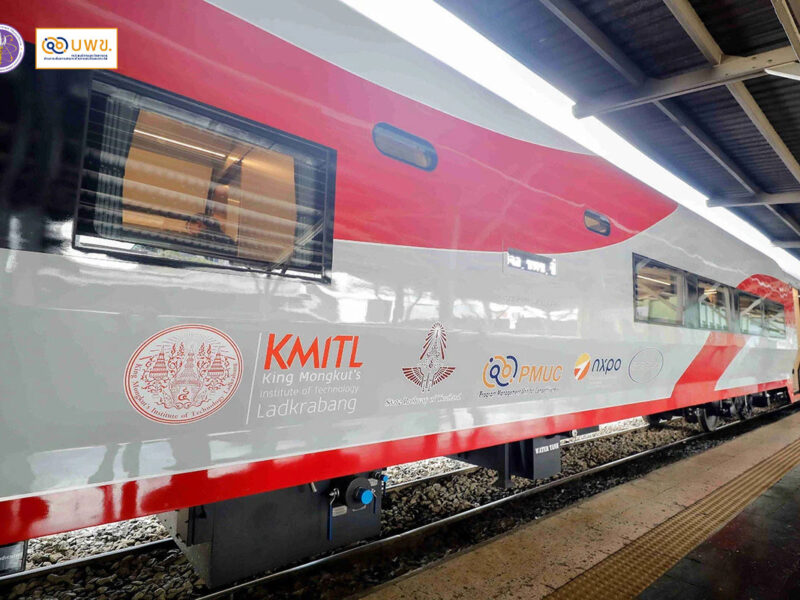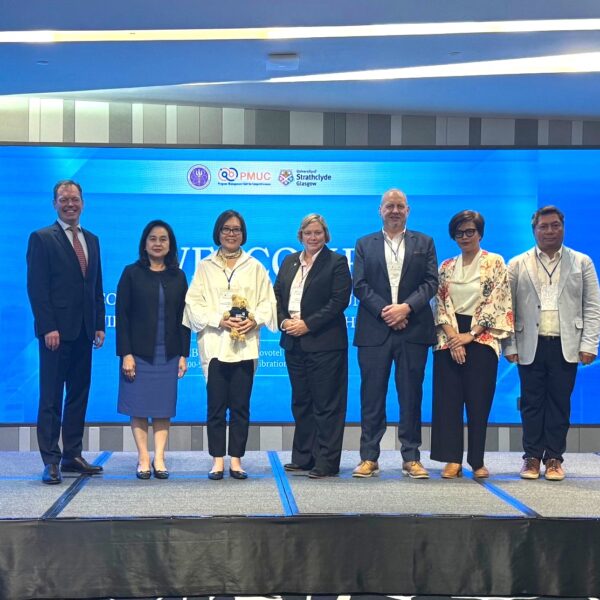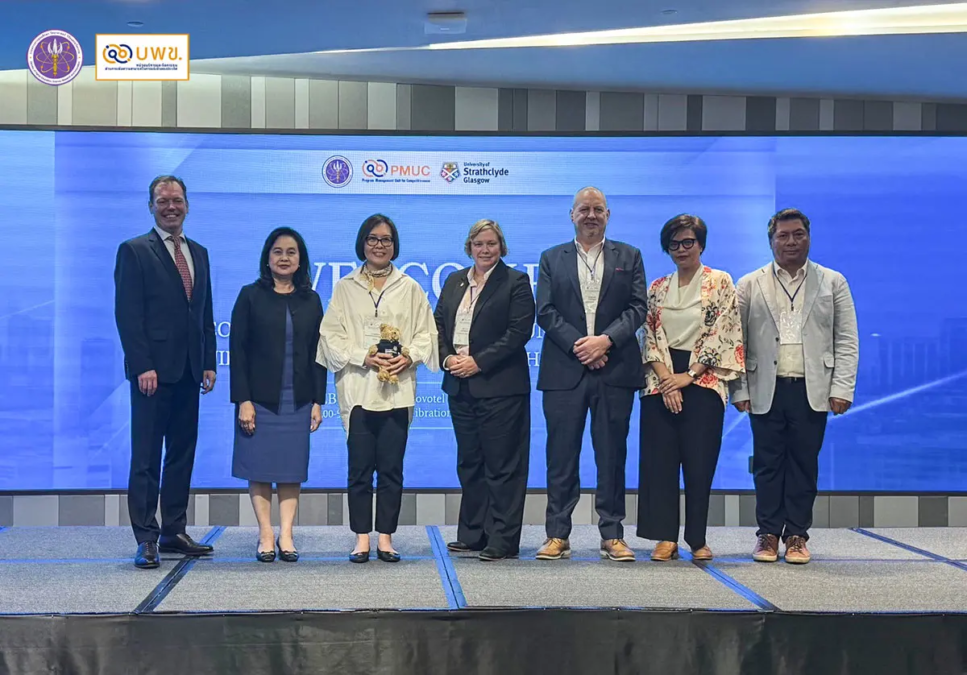
11 March 2025
Driving Thai universities forward to becoming Entrepreneurial Universities is another challenging mission in the development of modern Thai education throughout all eras. Being an Entrepreneurial University is not just about offering courses that create new entrepreneurs within the university; rather, educational institutions must also drive every mechanism to create an ecosystem that nurtures entrepreneurs. In particular, they must enhance the competitiveness of research and innovations developed by university personnel so that they advance towards production for practical commercial use.
And it would be highly beneficial if, in the process of advancing Thai universities towards becoming Entrepreneurial Universities, successful models from leading global universities were adopted. This is a key reason for organizing the seminar “Becoming an Entrepreneurial University: Building Bridge and Shaping the Future.”
The Program Management Unit for Competitiveness (PMUC), under the Ministry of Higher Education, Science, Research, and Innovation (MHESI), invited the University of Strathclyde, an “Entrepreneurial University,” which is one of the largest universities in Scotland, United Kingdom, located in Glasgow in the western part of Scotland, to share lessons learned on successfully creating an appropriate ecosystem for an Entrepreneurial University.
Various perspectives were shared by the executives from the University of Strathclyde in this seminar, which Thai universities can adapt to set their path towards becoming Entrepreneurial Universities. A key aspect is the creation of Leadership & Culture—leadership and a culture of entrepreneurship that permeates all levels of the organization, from executives to staff. Particularly, university executives must understand the principles of driving a university towards becoming an Entrepreneurial University to align the development of all internal and external sectors effectively.
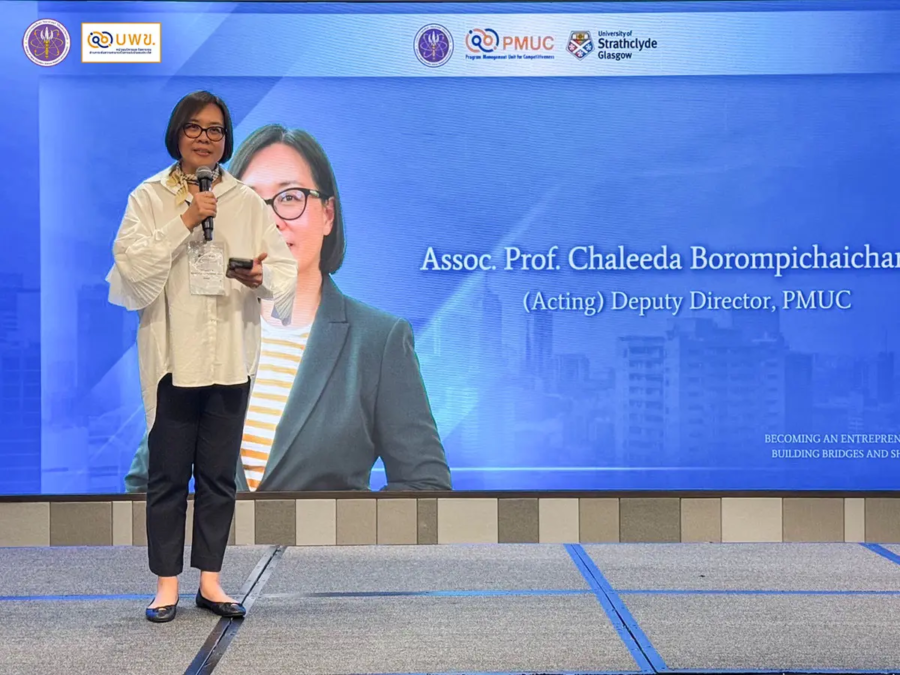
On this occasion, Associate Professor Dr. Chaleeda Borompichaichartkul, Deputy Director of Research Strategy, PMUC, delivered the opening speech and highlighted the significant role of PMUC:
“PMUC, or the Program Management Unit for Competitiveness, is a funding management agency that promotes collaboration between the public and private sectors, both domestically and internationally, to integrate science, technology, innovation, and various disciplines into the value chain. This creates high-value industrial products and services, enhances national competitiveness, and fosters sustainable economic, social, and environmental development.”
“PMUC is not just a funding agency to boost the competitiveness of research projects; we are part of building an ecosystem for Thai innovations. One of PMUC’s challenges is bridging the gap between Thai research projects and their development, increasing their potential for real commercial production. On this occasion, we would like to thank the University of Strathclyde, which is our partner and model in providing knowledge to senior research management executives and in developing Thai universities towards becoming sustainable Entrepreneurial Universities.”
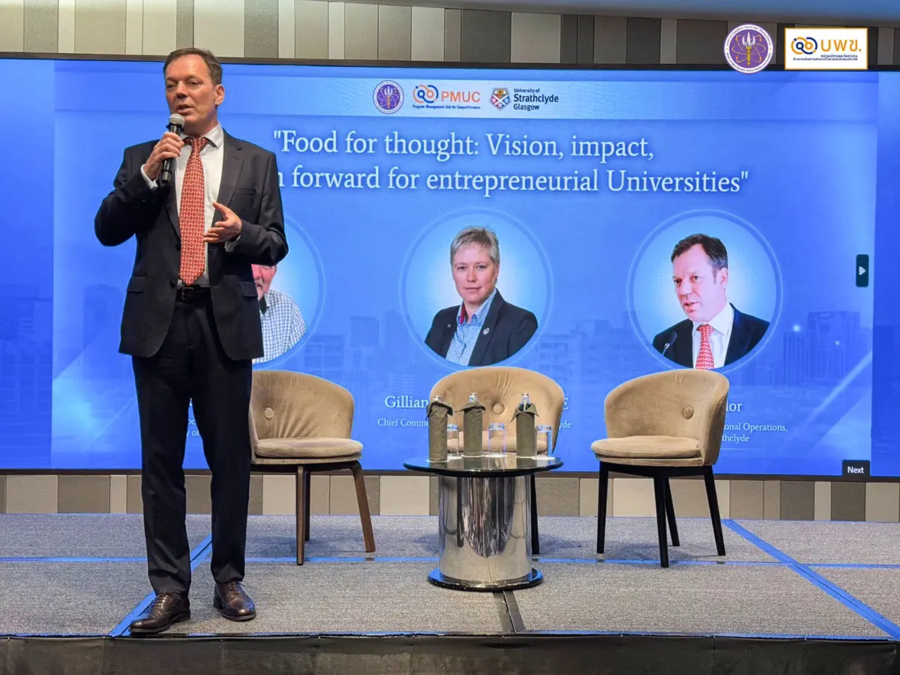
Challenges and Opportunities on the Path to Becoming an Entrepreneurial University of the University of Strathclyde.
Julian Taylor, Managing Director of the University of Strathclyde, spoke about the key challenges of becoming an Entrepreneurial University:
“The challenge of being an Entrepreneurial University lies in building bridges to pave the way for tangible innovation development and enhancement. Equally difficult is creating bridges that connect this collaboration with the country and its people. However, this challenge becomes easier if we work together as partners. The University of Strathclyde is delighted to be part of the effort to build an ecosystem with PMUC to elevate Thai innovation and empower Thai innovators to progress towards becoming successful innovation entrepreneurs effectively.”
“The University of Strathclyde was established in 1796 and is one of the largest universities in Scotland, United Kingdom, located in Glasgow, in the western part of Scotland. It is also situated in the heart of Glasgow, one of the most significant economic and industrial hubs in the UK. Apart from excelling in research that can be practically applied, the University of Strathclyde focuses on developing modern curricula that align with industry needs. Because of this, the University of Strathclyde has gained widespread recognition and has maintained strong relationships with business and industrial sectors over the years.”
“Due to these strengths, in 2013, the University of Strathclyde was awarded Entrepreneurial University of the Year by Times Higher Education. Additionally, in 2020, we were named the University of the Year in Scotland and received the Queen’s Anniversary Prize for higher and further education, which is the highest national honor.”
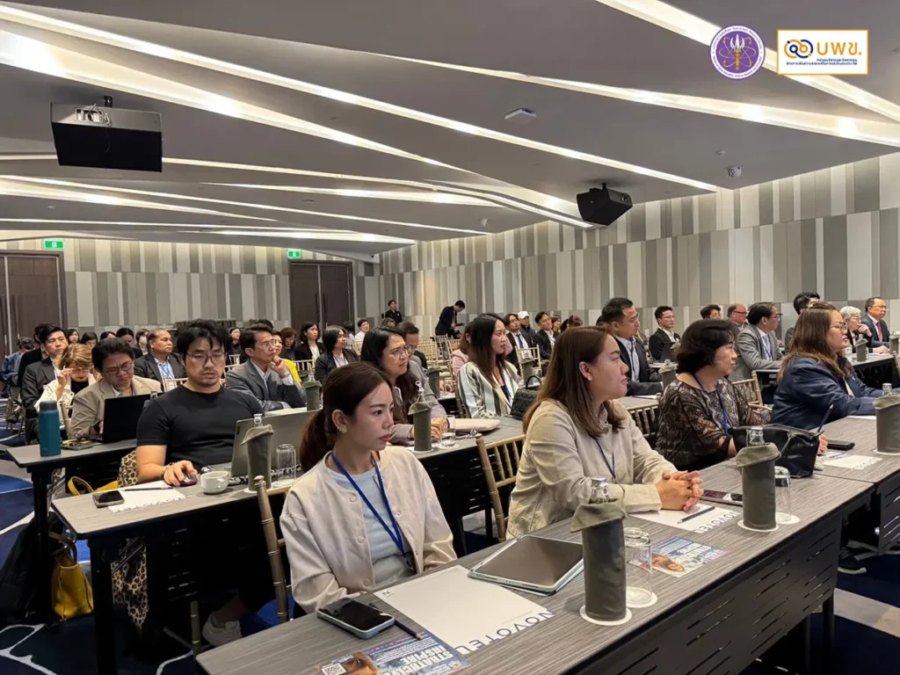
“The University of Strathclyde drives its development in alignment with the concept of an Entrepreneurial University by prioritizing benefits for the city and community. Additionally, it operates with a strong emphasis on collaboration between the public sector, industry, and various other sectors to create and elevate activities that foster opportunities for people—especially for the citizens of Glasgow and Scotland—while also positioning the United Kingdom as a global leader in science, innovation, and technology.”
“Our approach spans all dimensions, including social and environmental responsiveness, where our university plays a role in marine protection. In terms of local development, we collaborate with businesses, manufacturers, and industrial plants to improve and enhance the quality of products, goods, and services. Furthermore, regarding economic impact, our university serves as a hub for the research, development, and innovation of diverse technologies that drive the city’s economy forward.”
—-
“In regard to working with various countries around the world, we have also been a part of development and transition with energy production companies to plan the use of modern energy together with various countries in Southeast Asia. And this time as well, we have collaborated with PMUC and Thai universities in the form of a partnership to create an ecosystem for the science, technology, and innovation industry to grow on the path of becoming an Entrepreneurial University in a concrete manner.”
“In this sense, we see that the learning process between the University of Strathclyde, PMUC, and Thai universities will be a two-way learning process in order to truly understand the ecosystem for elevating innovation in Thailand to commercialization. From the perspective of the University of Strathclyde, entrepreneurship occurs through various contributing factors such as infrastructure, innovation-driven entrepreneurship networks, and funding support from various sectors. The University of Strathclyde is pleased to bring forth the strengths of the model we use to drive the Entrepreneurial University to success and share it to create a framework and an action plan leading to the goal of promoting and strengthening Thai innovative entrepreneurs together.”
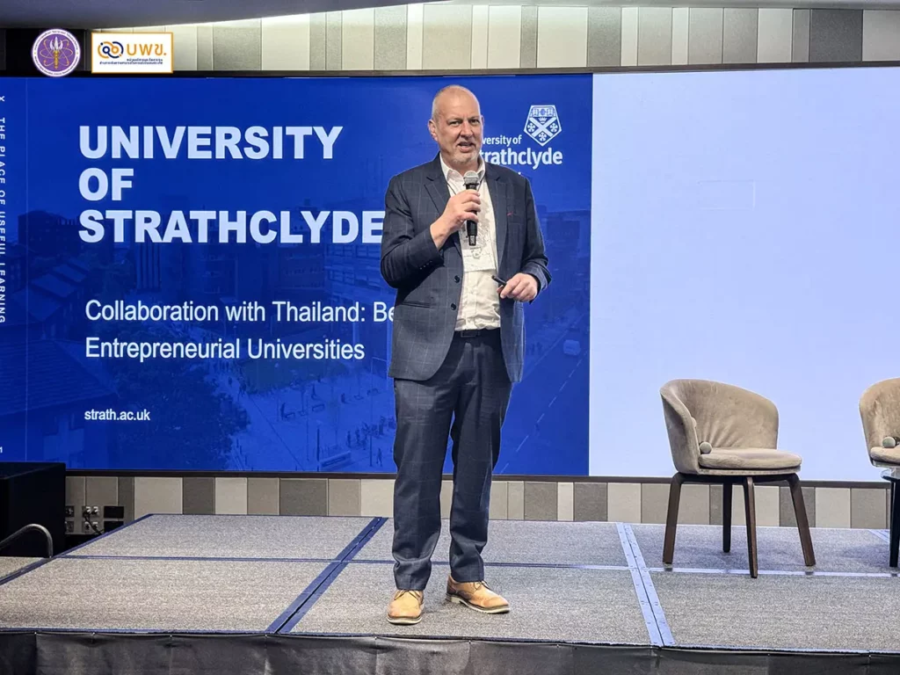
Extending the university’s success towards strengthening ‘Glasgow’ as a city of innovative entrepreneurs.
Professor Duncan Graham, Associate Principal & Executive Dean of Faculty of Science, University of Strathclyde, highlighted the approach to continuing the success of being an Entrepreneurial University towards strengthening Glasgow as a city of innovative entrepreneurs, stating:
“The University of Strathclyde was founded with determination and was not aimed at being driven in the same way as other leading universities in the United Kingdom. However, the University of Strathclyde also aspires to be a university where anyone seeking knowledge can confidently walk in and acquire various forms of knowledge. Regarding research presentations in various fields, the University of Strathclyde has been prominent in this area over time because more than 90 percent of our university’s research has been recognized at the world-leading level and has met the internationally excellent standards of the Times Higher Education Analysis of REF 2021.”
“Moreover, another strength of the University of Strathclyde is its location in the heart of Glasgow, earning it the reputation of being an accessible and beneficial learning space, not just for university students but also as a learning center and a hub for research and innovation for society at both national and global levels.”
“Additionally, the University of Strathclyde has built an ecosystem that responds to the essence of an Entrepreneurial University in various aspects, such as the establishment of the Technology and Innovation Centre (TIC) as a central hub for transforming cooperation between academia, such as universities, and business, industry, and government agencies.”
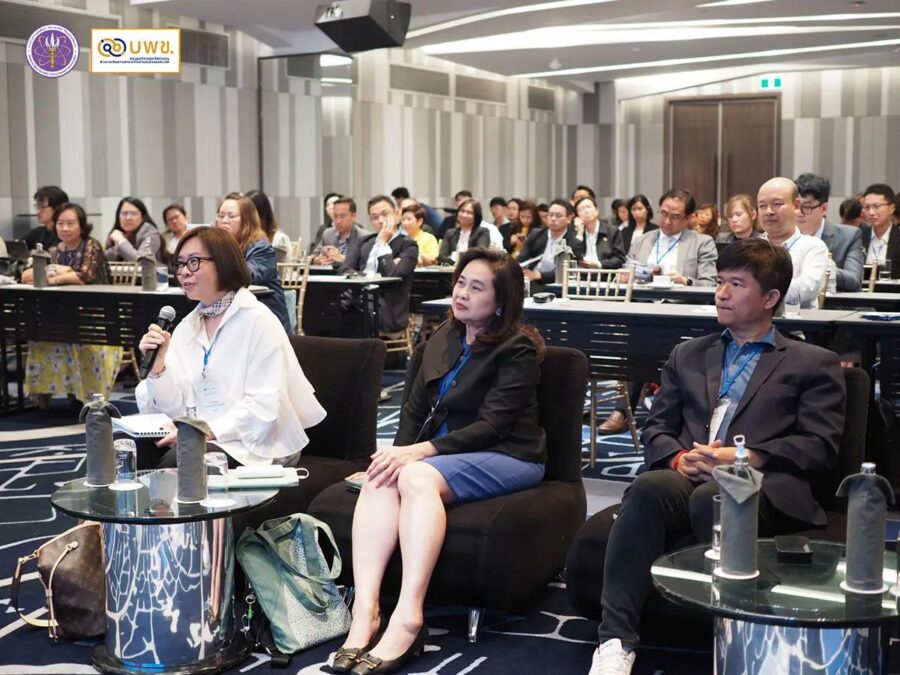
“For instance, cooperation between five business incubator centers or Catapults in the United Kingdom, four innovation promotion centers under the supervision of government agencies, and successful startup brands or SMEs with relatively high business growth rates. This also includes collaborations with industries and leading global brands to further develop and conduct joint research, such as Rolls-Royce, Pfizer, Siemens, and Cisco, as well as research centers aimed at promoting target industries.”
“Furthermore, the University of Strathclyde is a key driving mechanism for the Glasgow City Innovation District (GCID), which serves as a center for promoting new technology development, investment in innovative businesses, and fostering collaboration between universities, industry, and government. This has resulted in Glasgow becoming a city with numerous innovative companies that generate significant revenue, thereby ensuring Glasgow’s economic stability over time.”
“Not only that, but we have also established the Advanced Manufacturing Innovation District (AMIDS), located not far from Glasgow Airport. The proximity to the airport facilitates industries worldwide in traveling to AMIDS for knowledge exchange and collaboration in developing advanced manufacturing industries, as well as mutual learning to foster innovative entrepreneurs. AMIDS thus serves as another home for nurturing and incubating startups or future SME entrepreneurs. Moreover, AMIDS is also home to government innovation promotion centers, such as the National Manufacturing Institute Scotland (NMIS), which promotes the medical manufacturing industry.”
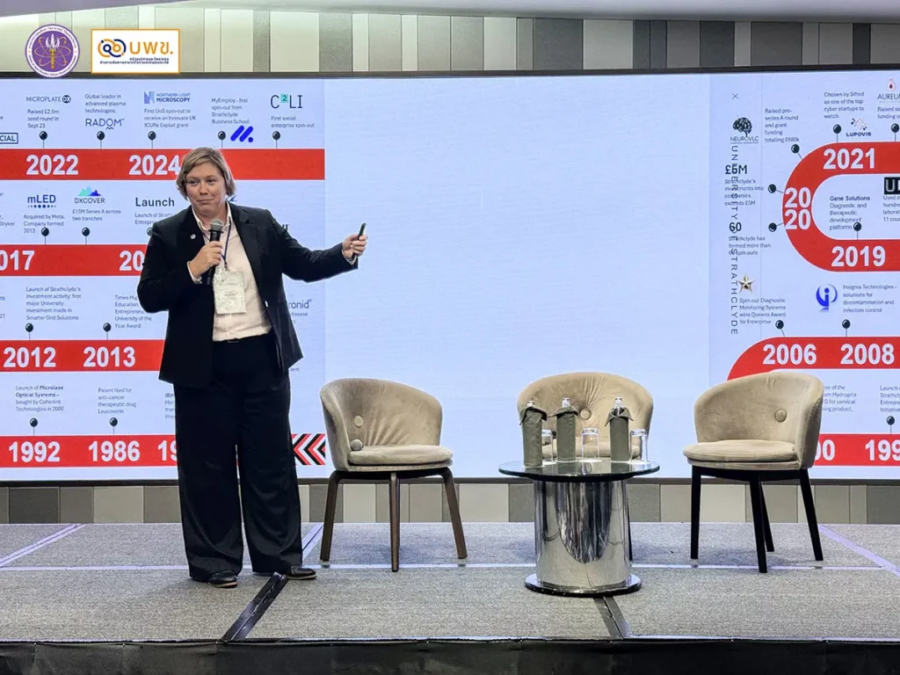
Sharing innovation-driving approaches to enhance the city’s competitiveness sustainably.
Gillian Docherty, Chief Commercial Officer, University of Strathclyde, stated that:
“Entrepreneurship does not only mean starting a business, but being a good entrepreneur also means contributing to society, the community, and the nation. Entrepreneurship refers to individuals with problem-solving skills who run businesses that inspire all sectors and those who can recognize opportunities and leverage them for maximum benefit. Therefore, fostering an entrepreneurial mindset among personnel is crucial.”
“Therefore, the University of Strathclyde’s curriculum responds to the concept of ‘Entrepreneurship for All,’ providing students with opportunities to see a clear path to entrepreneurship. At the same time, if anyone wishes to intern or work with SMEs or successful businesses, the University of Strathclyde has a broad business network ready to welcome everyone for learning and gaining entrepreneurial knowledge. If students graduate and wish to gain experience by working in these business sectors, they will also have strong profiles that increase their job opportunities. Moreover, university staff members will also be instilled with an understanding of entrepreneurship through a clear and strong organizational culture.”
“Additionally, the University of Strathclyde established the Entrepreneurs Fund in 2016, funded by the university and alumni, which now includes more than 18 businesses in its network. To date, this fund has generated more than £100,000 in investment. Furthermore, the Strathclyde Inspire Investment Fund, established in 2021, has an average investment of approximately £350,000 per company, with a current portfolio of 13 companies.”
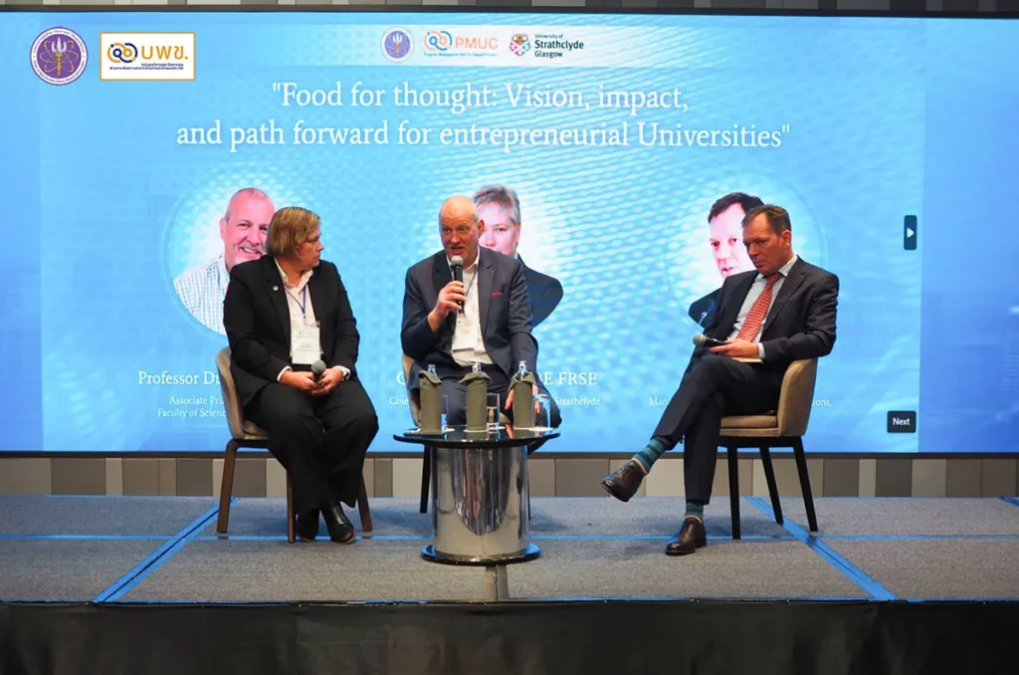
Regarding the promotion of innovation that effectively increases productivity, Gillian Docherty highlighted the key approaches and necessary components required, including:
• Support and promote cooperation among all sectors, such as GCID will regularly organize activities to respond to the development of entrepreneurial skills for everyone, extending to cooperation with national-level agencies and partnering with global partners to communicate the innovation city identity of Glasgow.
• Support the continuous development of new innovations by communicating externally about the Innovation Hub within the university network, assisting innovation businesses in establishing their businesses in the innovation district, and providing temporary workplaces in the innovation district. Develop innovation development courses in collaboration with the industry sector to design curricula.
• Act as a mentor and accelerator for the growth of innovation businesses, working with the innovation district and partners to expand cooperation, complete the ecosystem, and simultaneously provide support to businesses that want to organize events and promote their businesses, as well as serve as a medium to connect businesses for business partnerships.
• Connect academia with industry-relevant research by linking highly capable students with the business and industrial sectors while clearly communicating that the University of Strathclyde is a research-based university addressing industrial development, particularly in advanced technology and innovation for industries such as smart manufacturing systems, energy management, IoT, 5G, FinTech, Health Tech, etc.
• Collaborate in developing communities to grow and be recognized as an innovation city, engaging the community in all activities held at GCID and promoting businesses, including creating content to communicate the uniqueness of innovation businesses.
• Extend towards building a sustainable entrepreneurial ecosystem, fostering a learning society that paves the way for innovation entrepreneurship by connecting cooperation among all sectors to understand the same context and fostering collaboration among innovation businesses within the innovation district for the benefit of all sectors in driving an innovation city.
Furthermore, Gillian Docherty answered an important question regarding the context of Thailand: Where should the development of an ecosystem for Thai innovation entrepreneurs begin? Gillian emphasized that “it should start with the resources we have,” elaborating that she believes Thai universities have a vast amount of research and innovation that have yet to be developed and commercialized. Currently, PMUC and various agencies have played an important role in supporting and promoting these research works to be continuously produced for practical use.
“However, what needs to be further emphasized is fostering partnerships between industry and the academic or research sector of the country. This should be continuously increased because the industrial sector inevitably faces problems, obstacles, and issues that require experts or even entrepreneurs with fresh ideas to help solve these problems. At the same time, all sectors must work together to create new regulations that facilitate the development of this ecosystem, as well as strive to amend outdated regulations or laws to accommodate industries that wish to collaborate with the academic or research and development sector.”
Professor Duncan Graham also highlighted Thailand’s strengths in having an entrepreneurial ecosystem in leading industrial sectors, such as the food manufacturing industry, which is already well-developed and diverse. Building upon this strength to establish an Entrepreneurial University or an innovation entrepreneurship ecosystem is therefore not difficult.
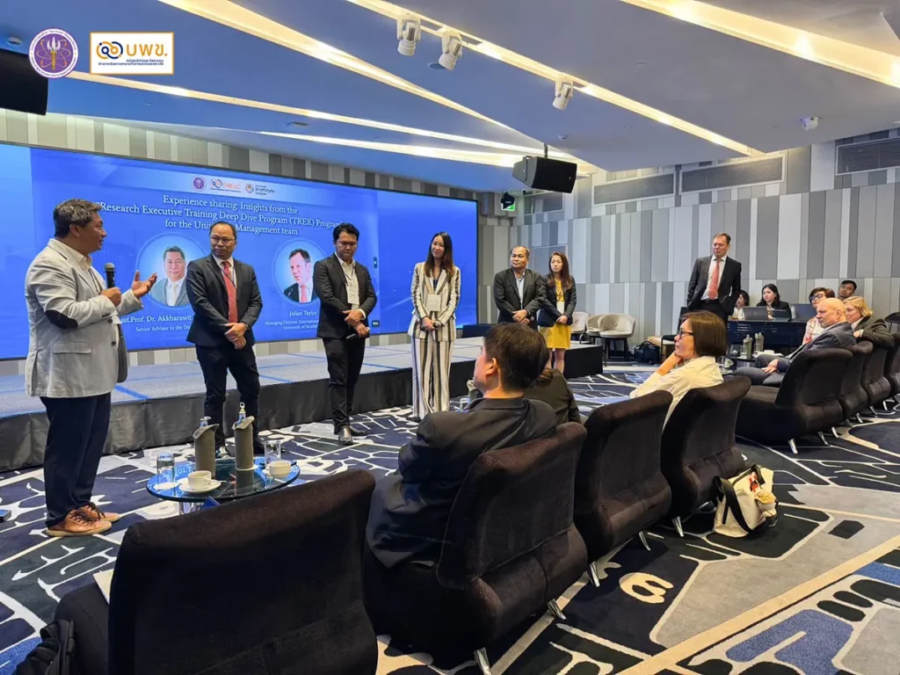
PMUC has extracted lessons from the success of the University of Strathclyde for the University Executive Capacity Development Project (Top Research Executive Training Deep Dive Program: TREX) to advance towards a full-fledged Entrepreneurial University.
Assistant Professor Dr. Akarawit Kanjanopas, Senior Advisor of PMUC, shared insights gained from studying the University of Strathclyde, which can be adapted for developing an entrepreneurial university in Thailand:
“The opportunity to learn from the University of Strathclyde is not only beneficial to PMUC but also to Thailand, particularly in learning approaches to developing Thai universities into Entrepreneurial Universities and strengthening the ecosystem within their own universities. This aims to foster collaboration with agencies or organizations involved in innovation development and innovation business development. We intend to adapt the successful model used by the University of Strathclyde to develop Thai universities.”
“A key point is that we believe most university researchers understand the approach to creating an entrepreneurial university ecosystem. However, university executives still require communication to align their understanding in driving an entrepreneurial university in Thailand. Observing the University of Strathclyde’s development model, advancing an entrepreneurial university requires commitment from all levels, from university founders, senior executives, faculty members, to staff, to understand the concept and approach to making the University of Strathclyde an Entrepreneurial University. They must collaborate and do everything to ensure awareness and acceptance, while this concept also connects and spreads to all citizens and sectors in Glasgow, leading to widespread cooperation.”
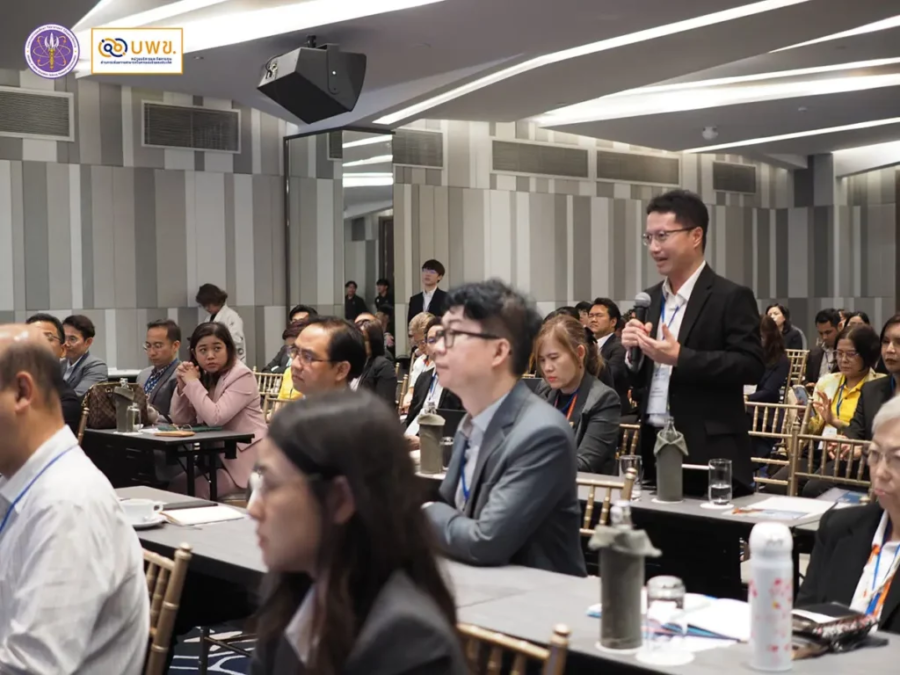
“For this reason, we see that one of the key successes in creating an Entrepreneurial University is transformational leadership that aligns with university development towards an entrepreneurial university. An example from the University of Strathclyde is the fundamental concept laid by Professor Sir Jim McDonald, establishing the foundation of an Entrepreneurial University. Today, it has become an organizational culture, something Thailand currently lacks. He has been an administrator for 16 years, making everyone in the university and the city familiar with Sir Jim McDonald.”
“Today, PMUC has launched its first program, modeled after the University of Strathclyde, extracting lessons to develop Thai university executives through the High-Level Research Executive Capacity Development Program (TREX). This training program targets senior research executives from universities and funding agencies, including Vice Presidents for Research/Innovation, Vice Presidents for Planning and Budgeting, Assistant Presidents for Research/Innovation, and those responsible for research management, research budget management, and resource management within universities efficiently. The program focuses on research management for commercial application.”
“Being an Entrepreneurial University is not just about creating startups. It is about creating individuals who think like entrepreneurs: Think as an Entrepreneur / Behave like an Entrepreneur / Doing Research as an Entrepreneur.”
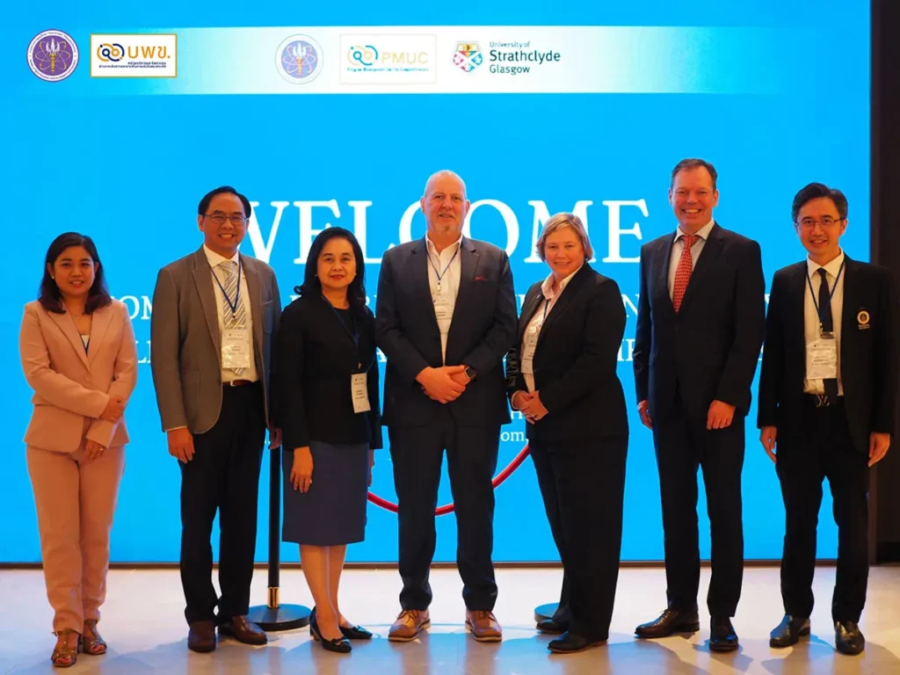
“This is another crucial mission of PMUC that is just as important as other missions. We believe that if we do not establish an ecosystem within Thai universities by instilling the mindset of an Entrepreneurial University in university executives, the research funding provided by PMUC to university researchers may not effectively enhance the competitiveness of research projects, innovations, and technology in Thailand. Researchers may not be able to fully develop their research if they do not receive support from their affiliated universities.”
“From the TREX program and observing the success of the Entrepreneurial University at the University of Strathclyde, we see the need to emphasize social science research projects as well. These projects have the potential to foster entrepreneurship, but in the past, we have focused only on the development and expansion of research projects related to science and technology or Deep Science & Technology, neglecting social science research. From our study visit, we observed successful research projects in Education Technology or Mass Communication Technology.”

